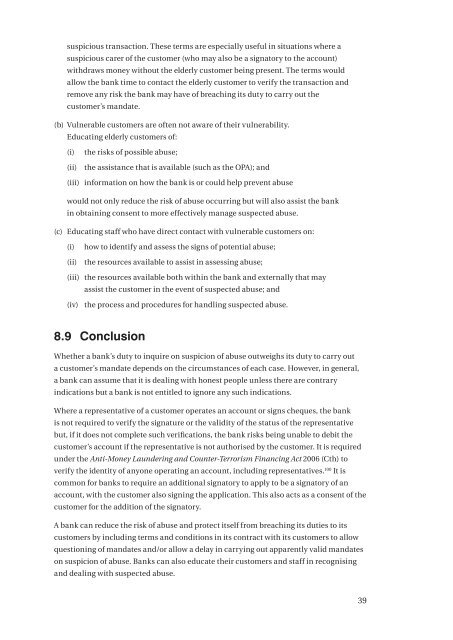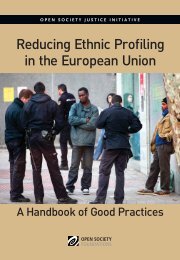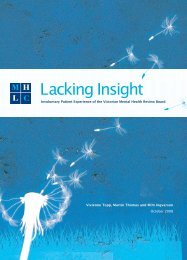Responding to the financial abuse of older people - Loddon ...
Responding to the financial abuse of older people - Loddon ...
Responding to the financial abuse of older people - Loddon ...
- No tags were found...
Create successful ePaper yourself
Turn your PDF publications into a flip-book with our unique Google optimized e-Paper software.
suspicious transaction. These terms are especially useful in situations where a<br />
suspicious carer <strong>of</strong> <strong>the</strong> cus<strong>to</strong>mer (who may also be a signa<strong>to</strong>ry <strong>to</strong> <strong>the</strong> account)<br />
withdraws money without <strong>the</strong> elderly cus<strong>to</strong>mer being present. The terms would<br />
allow <strong>the</strong> bank time <strong>to</strong> contact <strong>the</strong> elderly cus<strong>to</strong>mer <strong>to</strong> verify <strong>the</strong> transaction and<br />
remove any risk <strong>the</strong> bank may have <strong>of</strong> breaching its duty <strong>to</strong> carry out <strong>the</strong><br />
cus<strong>to</strong>mer’s mandate.<br />
(b) Vulnerable cus<strong>to</strong>mers are <strong>of</strong>ten not aware <strong>of</strong> <strong>the</strong>ir vulnerability.<br />
Educating elderly cus<strong>to</strong>mers <strong>of</strong>:<br />
(i)<br />
(ii)<br />
<strong>the</strong> risks <strong>of</strong> possible <strong>abuse</strong>;<br />
<strong>the</strong> assistance that is available (such as <strong>the</strong> OPA); and<br />
(iii) information on how <strong>the</strong> bank is or could help prevent <strong>abuse</strong><br />
would not only reduce <strong>the</strong> risk <strong>of</strong> <strong>abuse</strong> occurring but will also assist <strong>the</strong> bank<br />
in obtaining consent <strong>to</strong> more effectively manage suspected <strong>abuse</strong>.<br />
(c) Educating staff who have direct contact with vulnerable cus<strong>to</strong>mers on:<br />
(i)<br />
(ii)<br />
how <strong>to</strong> identify and assess <strong>the</strong> signs <strong>of</strong> potential <strong>abuse</strong>;<br />
<strong>the</strong> resources available <strong>to</strong> assist in assessing <strong>abuse</strong>;<br />
(iii) <strong>the</strong> resources available both within <strong>the</strong> bank and externally that may<br />
assist <strong>the</strong> cus<strong>to</strong>mer in <strong>the</strong> event <strong>of</strong> suspected <strong>abuse</strong>; and<br />
(iv) <strong>the</strong> process and procedures for handling suspected <strong>abuse</strong>.<br />
8.9 Conclusion<br />
Whe<strong>the</strong>r a bank’s duty <strong>to</strong> inquire on suspicion <strong>of</strong> <strong>abuse</strong> outweighs its duty <strong>to</strong> carry out<br />
a cus<strong>to</strong>mer’s mandate depends on <strong>the</strong> circumstances <strong>of</strong> each case. However, in general,<br />
a bank can assume that it is dealing with honest <strong>people</strong> unless <strong>the</strong>re are contrary<br />
indications but a bank is not entitled <strong>to</strong> ignore any such indications.<br />
Where a representative <strong>of</strong> a cus<strong>to</strong>mer operates an account or signs cheques, <strong>the</strong> bank<br />
is not required <strong>to</strong> verify <strong>the</strong> signature or <strong>the</strong> validity <strong>of</strong> <strong>the</strong> status <strong>of</strong> <strong>the</strong> representative<br />
but, if it does not complete such verifications, <strong>the</strong> bank risks being unable <strong>to</strong> debit <strong>the</strong><br />
cus<strong>to</strong>mer’s account if <strong>the</strong> representative is not authorised by <strong>the</strong> cus<strong>to</strong>mer. It is required<br />
under <strong>the</strong> Anti-Money Laundering and Counter-Terrorism Financing Act 2006 (Cth) <strong>to</strong><br />
verify <strong>the</strong> identity <strong>of</strong> anyone operating an account, including representatives. 100 It is<br />
common for banks <strong>to</strong> require an additional signa<strong>to</strong>ry <strong>to</strong> apply <strong>to</strong> be a signa<strong>to</strong>ry <strong>of</strong> an<br />
account, with <strong>the</strong> cus<strong>to</strong>mer also signing <strong>the</strong> application. This also acts as a consent <strong>of</strong> <strong>the</strong><br />
cus<strong>to</strong>mer for <strong>the</strong> addition <strong>of</strong> <strong>the</strong> signa<strong>to</strong>ry.<br />
A bank can reduce <strong>the</strong> risk <strong>of</strong> <strong>abuse</strong> and protect itself from breaching its duties <strong>to</strong> its<br />
cus<strong>to</strong>mers by including terms and conditions in its contract with its cus<strong>to</strong>mers <strong>to</strong> allow<br />
questioning <strong>of</strong> mandates and/or allow a delay in carrying out apparently valid mandates<br />
on suspicion <strong>of</strong> <strong>abuse</strong>. Banks can also educate <strong>the</strong>ir cus<strong>to</strong>mers and staff in recognising<br />
and dealing with suspected <strong>abuse</strong>.<br />
39
















